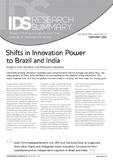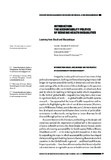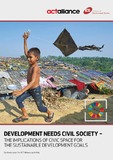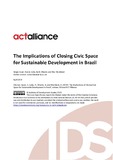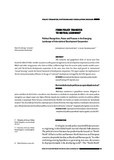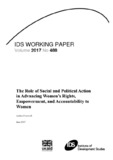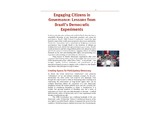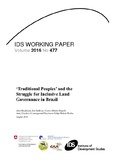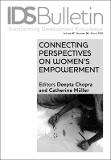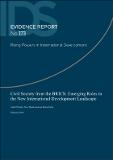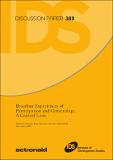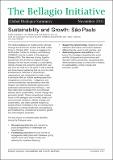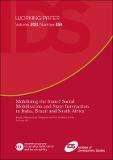Brazil - Democracy, Civil Society, Citizenship and Governance
Browse by
Recent Submissions
-
Cultures of Politics, Spaces of Power: Contextualizing Brazilian Experiences of Participation
(Taylor and Francis, 2013-07-02)Brazilian democratic innovation is gathering considerable international attention, spawning a growing interest in replicating the institutional designs of its participatory governance institutions in countries with very ... -
Trade Liberalization and the Rise of Populism in Brazil
(UNU-WIDER, 2020)This paper investigates the long-term impact of economic shocks on populism, by exploiting a natural experiment created by the trade liberalization process implemented in Brazil between 1990 and 1995. This high impact and ... -
Shifts in Innovation Power to Brazil and India
(IDS, 2012-02)Analysts tend to explain the shift in innovation power by concentrating on factors within the rising powers, such as their investment in high-level education, their low labour cost, their big and expanding internal markets ... -
Introduction: the Accountability Politics of Reducing Health Inequalities. Learning from Brazil and Mozambique
(CEBRAP, 2019-05-01)Inequality is a key political issue of our times. It has political consequences, fuelling conflict and raising legitimacy challenges for regimes around the world, in democratic and non‑demo‑ cratic settings alike. At the ... -
Development Needs Civil Society - The Implications of Civic Space for the Sustainable Development Goals
(IDS, 2019-04-01)This report analyses the implications for development of the recent wave of closures of civic space that has primarily affected human rights-based and liberal democratic organizations - non-governmental organizations ... -
The Implications of Closing Civic Space for Sustainable Development in Brazil
(2019-04-30)This report on Brazil is one of a set of four country case studies designed to study the implications of closing civic space for the achievement of the Sustainable Development Goals (SDGs). The case study was commissioned ... -
From Policy Transfer to Mutual Learning?: Political Recognition, Power and Process in the Emerging Landscape of International Development Cooperation
(Novos estudos CEBRAP, 2017-01-27)The economic and geopolitical shifts of recent years have forced the oecd-dac member countries to offer greater recognition to the development cooperation activities of the BRICS and other rising powers, who claim to follow ... -
Redistributive Preferences and Protests in Latin America
(SAGE Journals, 2019-02-12)This article analyzes the role of individual redistributive preferences on protest participation. The article focuses on Latin America, a region that has experienced substantial protests and demonstrations in the last ... -
The Role of Social and Political Action in Advancing Women’s Rights, Empowerment, and Accountability to Women
(IDS, 2017-06)Through the lens of four case studies focused on women’s political participation (Palestine and Sierra Leone), and the passage of domestic violence law (Brazil and South Africa), this paper looks at the role of social and ... -
‘Traditional Peoples’ and the Struggle for Inclusive Land Governance in Brazil
(Institute of Development Studies, 2016-08-24)In recent decades, Brazil has attracted international interest both for the intensity of its land conflicts and for the extent of its land governance innovations. In this report we argue that these innovations have derived ... -
Family, Households and Women’s Empowerment in Bahia, Brazil, Through the Generations: Continuities or Change?
(Institute of Development Studies, 2016-03-03)This article identifies changes and continuities in gender relations in a working class neighbourhood in Salvador, Bahia, through the generations. Based on data collected over a period of nearly 20 years, it seeks to ... -
Civil Society from the BRICS: Emerging Roles in the New International Development Landscape
(IDS, 2016-02)There is a burgeoning literature on the (re)emergence of the BRICS countries – Brazil, Russia, India, China and South Africa – as significant actors in international development. To date, however, most attention has focused ... -
Brazilian Experiences of Participation and Citizenship: a Critical Look
(Institute of Development Studies, 2008)Brazil's emergence from two decades of military dictatorship in the mid-1980s gave rise to a flowering of democratic innovation. Experiences during the struggle for democracy shaped the experiments that took place over the ... -
Sustainability and growth: São Paulo
(IDS, 2011)The Global Dialogue on Sustainability, Climate Change and Economic Growth was held in São Paulo in October 2011. It was co-organised by the Brazilian Centre for Analysis and Planning (CEBRAP) and the Institute of Development ... -
Mobilising the state? Social mobilisation and state interaction in India, Brazil and South Africa
(Institute of Development Studies (UK), 2011-04)This paper explores how social mobilisation and the state interact, influence and mutually constitute each other in India, Brazil and South Africa. Given their broad similarities of democratic political structures, as ...



